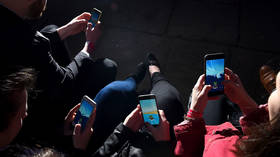With ‘dopamine fasting’ becoming a thing, Silicon Valley embraces its religious side
10 Oct, 2019 15:19 / Updated 25 minutes ago

‘Dopamine fasting’ is a craze making its way around Silicon Valley, as the technological elite cut down on smartphone usage, binge eating, and gluttonous porn consumption. But isn’t penance by another name still penance?
The phrase ‘Silicon Valley’s latest trend’ should be enough to set alarm bells ringing by itself. From venture capitalist Peter Thiel’s reported interest in injecting young blood in a bid to live forever, to Mark Zuckerberg slaughtering a goat with a “laser gun” for its meat, our technological overlords partake in pastimes more deranged than yoga lessons or pottery classes.
The ‘dopamine fast’ is the latest such trend. Psychiatry professor Dr. Cameron Sepah coined the term in a LinkedIn post in August, and claims that he has popularized it among his mega-rich clients in Silicon Valley. Put simply, Sepah advises that we all limit our exposure to six overstimulating activities: “pleasure eating, browsing the internet or playing video games, gambling or shopping, viewing pornography or masturbating, thrill seeking and recreational drugs,” so as not to burn out our ability to feel pleasure.
Dopamine is a neurotransmitter that rewards us with a spike of pleasure when something good happens. In a more primordial era, this kept us motivated to seek food and reproduce, hence why eating and sex feel so great. However, our smartphones and Netflix subscriptions give us this same dopamine hit. That ‘one more page’ buzz you feel when you scroll through reddit in bed and the satisfaction of having 300 people like your latest Instagram booty-shot (we all know it’s not about fitness), that’s dopamine in action.
There is a wealth of scientific research demonstrating how smartphones and social media are literally rewiring our brains, and not for the better. However, there is no research proving the effectiveness of a ‘dopamine fast’ in rebalancing brain chemistry. That hasn’t stopped California hipsters from going all in on the trend, though, with some reportedly switching to ice-cold showers and cutting conversations short to avoid the dopamine hit of a chat with friends.
In an instance of the Bay Area being very Bay Area: today was my first day in SF since moving here, and I ran into someone from my YC batch who told me he was on a “dopamine fast” and thus had to cut our convo short (lest he acquire too much dopamine)
1,047 people are talking about this
Among the progress-obsessed transhumanists of Silicon Valley, Sepah has earned guru status. But what he suggests is not new.
From the asceticism of ancient Christianity, to the starving Buddah, to modern Muslims denying themselves pleasure during Ramadan, nearly every world religion advocates denial and sacrifice as a means of reaching enlightenment.
Seneca would take long walks in the countryside to get away from the hustle and bustle of ancient Rome, “so that the mind might be nourished and refreshed by the open air and deep breathing.” In the 1980s punk scene, ‘straight edge’ artists avoided the drugs, alcohol and promiscuous sex beloved by their peers. Nowadays the ‘NoFap’ community on Reddit eschews masturbation to “reboot” their brains’ pleasure centers.
Self-denial has been practiced and preached for millenia, but by wrapping his message in the cold scientific language beloved by hipsters and geeks, Sepah has brought the medieval concept of penance into the 21st century.
ALSO ON RT.COMYouTube vegans earned millions. But when they quit all hell broke loose. Should we pity them?
Imagine if some Archpriest Ivanov sashayed into Menlo Park and told Facebook employees to ditch the soy lattes, give up superhero movies, leave social networks and periodically starve themselves. He’d be sent packing on the first flight back to Moscow. With the right branding and the right positioning, Sepah and the dopamine fasters sell essentially the same lifestyle, albeit repackaged for our times.
All of this raises one important question too. Facebook prides itself on “connecting you to everything you care about.” Instagram encourages users to “seize the moment and share it with the whole globe.” Twitter reminds us that “if it’s happening anywhere, it’s happening on Twitter.”
We may mock the dopamine fasters, but if even the committed tech evangelists of Silicon Valley are putting down their devices in the name of health, shouldn’t we take a leaf from their book? After all, crack cocaine dealers make a lot of money selling poison, but don’t get high on their own supply.
By Graham Dockery, RT



0 Comments:
Post a Comment
Subscribe to Post Comments [Atom]
<< Home